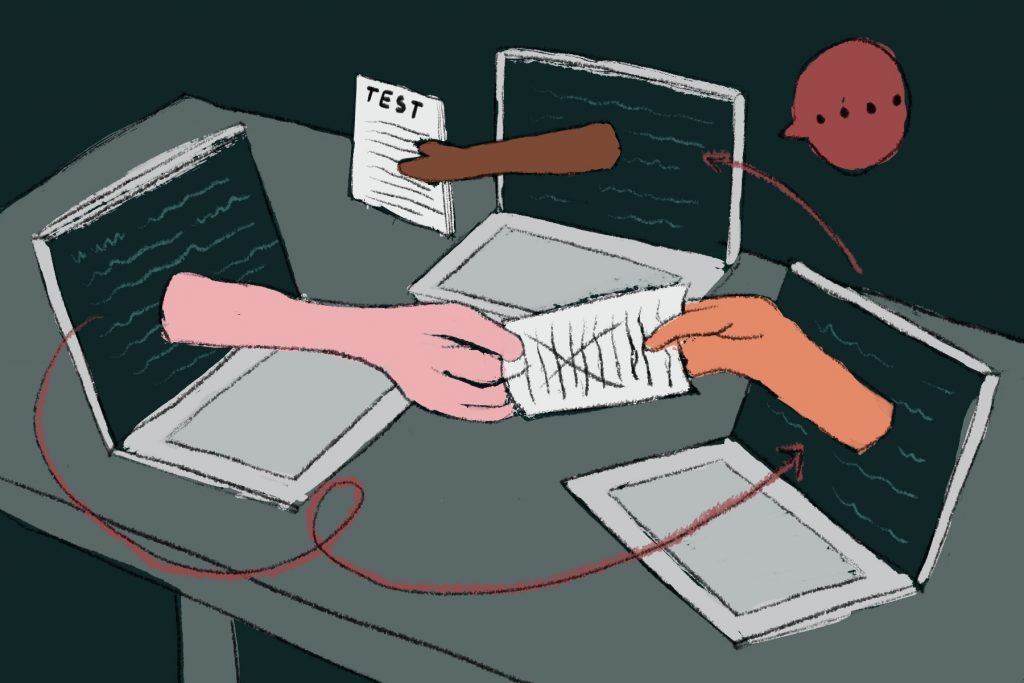With the COVID-19 pandemic causing many in-person classes to shift to online and hybrid teaching styles, Binghamton University has been battling a stark increase in academic dishonesty cases.
Professors in the Harpur College of Arts and Sciences use the Harpur College Academic Honesty Policy, a code designed to inform students of the definitions and consequences of academic dishonesty. The Harpur College Academic Honesty Policy outlines two different types of offenses — Category I and Category II. Category I offenses include cheating, plagiarism and unauthorized collaboration, while Category II offenses include forgery, bribery and more serious cases of Category I offenses. Douglas Jones, Harpur Academic Honesty Committee chair, said academic dishonesty rates increased during the fall 2020 semester.
“Overall, violations of the academic honesty code have increased significantly in 2020,” Jones wrote in an email. “Since 2006, we’ve averaged 83 minor infractions of the honesty code in [Harpur College] each year and 12 major [Category II] infractions. 2020 saw 143 minor infractions and 23 major infractions by my count.”
Jones also said many of these infractions were related to online testing, which is what many classes had to resort to after professors moved final examinations online at the end of the fall 2020 semester.
“Much of this has involved exams — specifically, the use of websites for ‘expert help’ and unauthorized collaboration during exams via various online discussion platforms,” Jones wrote.
Additionally, Jones said plagiarism has remained a constant problem for the Harpur Academic Honesty Committee.
“Plagiarism remains an issue, of course,” Jones wrote. “This can involve everything from students stealing a sentence or two from other authors to students purchasing entire papers from paper mills. About half the time, instructors catch plagiarism by noticing shifts in student writing. The other half are caught by Turnitin.”
Many professors have started to use resources like Turnitin, which monitors student papers for plagiarism, ensuring that students are not taking another author’s words and presenting them as their own.
Valerie Schreiner, chief product and marketing officer of Turnitin, a company whose software aids in the detection of plagiarism for student papers, said the company has seen its user base increase during the COVID-19 pandemic but has not recorded an increase in plagiarism rates.
Students who are going through academic dishonesty cases can turn to the Student Association’s (SA) Advocates program, which exists to inform and advise students of the details of the conduct process, as well as advocate for students and make them aware of their rights.
Joshua Dorfman, SA vice president for academic affairs and a junior majoring in integrative neuroscience, said while there has not been a visible increase in academic dishonestly cases, professors may be paying more attention to the issue given the semester largely took place online.
“In terms of seeing an increase through my official capacity, I would have to say no,” Dorfman wrote in an email. “I think it just appears to be increased due to greater faculty awareness of an issue that already exists, but has come to light more due to the shift to online learning.”
One student, who wished to remain anonymous, said they noticed their professors took more precautions to combat plagiarism during the fall 2020 semester.
“Many of my professors have made the exams or quizzes where you can only answer [and] see a question once,” the anonymous student said. “Although as students we understand that cheating is not acceptable, it makes it difficult for the people who don’t participate in cheating to effectively take a quiz or exam. Unfortunately, it just makes students anxious and more stressed for their classes.”



